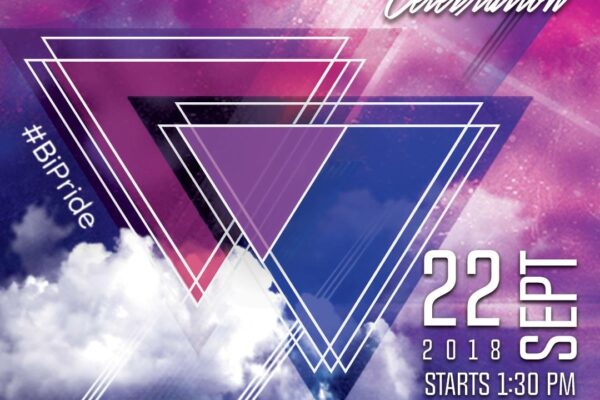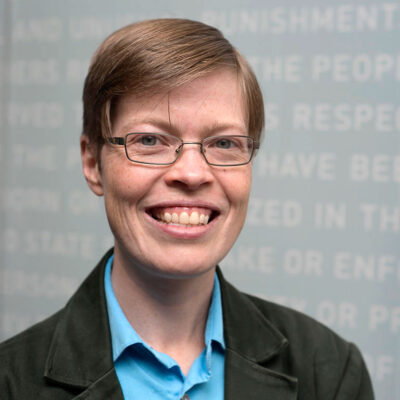On Saturday, we're celebrating Bisexual Pride in West Hollywood. Featuring a Bi Visibility Walk, an info fair, and of course a party, WeHo Bi Pride is believed to be the first event of its kind ever officially sponsored by a U.S. city and coincides with global observances of Bisexual Awareness Week. The ACLU SoCal is proud to co-sponsor WeHo Bi Pride 2018, alongside amBi and the Human Rights Campaign. Here are five reasons why we're showing up for Bi Pride:
1. Millions of people in the U.S. identify as bisexual.
The word "bisexual" refers to a sexual orientation that includes attraction to people of more than one gender. Even though studies have found that more Americans identify as bisexual than as gay or lesbian, the bisexual community struggles with stigma, stereotypes, and invisibility. Contrary to popular misconceptions, not all bisexual people experience attraction to men and women equally or simultaneously. Bisexual people are capable of monogamy (although, as in every other community, not all choose it). Bisexuality is a lifelong identity for millions of people, though many gays and lesbians who briefly called themselves bisexual while grappling with the coming-out process have a problematic tendency to assume that anyone else who identifies as bisexual is also just "going through a phase."
2. Bisexual people face a unique set of struggles.
In addition to dealing with ignorance and social ostracism from both the straight and gay communities, data shows that bisexual folks collectively are having a tough time in many areas of life. According to a 2013 survey, only 28 percent of bisexual Americans were "out" to all the important people in their lives. Forty-six percent of bisexual women have experienced rape (almost three times the figure for straight women), and bisexual women also disproportionately endure intimate partner violence. Mental health challenges and smoking are more prevalent among bisexual people than those of other sexual orientations. Bisexual people also earn less money, on average, than other Americans. Bisexual immigrants with a credible fear of persecution based on sexual orientation in the countries they left have struggled to get asylum when immigration judges assumed they could just act straight to avert problems. Similarly, some jails have created separate housing units or other safety protocols to protect gay men from sexual violence but excluded men they deemed bisexual. People of color, women, and people who are transgender are especially likely to identify as bisexual, often resulting in intersectional and compounded forms of discrimination.
3. We love Kesha.
On the plus side, a growing number of celebrities are confirming to the world that they are attracted to people of more than one gender. From gun safety advocate Emma González, to singers Michael Stipe, Kesha, and Frank Ocean, to comedian Margaret Cho, to actors Alan Cumming, Asia Kate Dillon, and Amandla Stenberg, to Oregon Governor Kate Brown and Arizona Congressmember and U.S. Senate candidate Kyrsten Sinema, possibility models are more and more available for bisexual folks.
4. Young people need and deserve sex ed that covers bisexuality.
Communities, schools, and families also have the power to help make things better for the next generation by providing comprehensive sex education that addresses diversity in sexual orientation and gender identity, as well as consent, contraception, and the myriad other things bisexual young people and others need to know to make healthy choices about sex and relationships. Here in California, the ACLU is working with communities around the state to ensure full implementation of the California Healthy Youth Act, which since 2016 has required public middle and high schools to provide comprehensive sex ed. We’re also proud to have cosponsored AB 2601, a bill signed into law just this week by Governor Jerry Brown that will similarly ensure comprehensive sex ed for students in California charter schools. Today’s students are hearing in school that bisexuality is real, which will help those who come to identify as bisexual feel seen and valued, as well as help break down misconceptions across our broader society.
5. We can all help end bi erasure.
Finally, all of us have a part to play in ending bi erasure. Watch your language — are you referring to "gay marriage" or "gay sex" when that's not necessarily what you mean, or to the male-female couple next door as your "straight neighbors” when you don’t know them well enough to be sure that's actually how they both identify? Conversely, are you part of an organization that has "LGBT" in its name but has never reached out to bisexual community members or assessed their needs and priorities? Given deeply-rooted and dismissive stereotypes, simply acknowledging bisexuality as a real and valid identity is an important step toward building the future we want to see for people of all sexual orientations.


